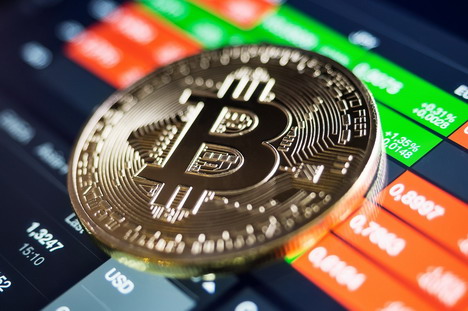10 Ways: How to Choose the Best Exchange for Bitcoin Trading
Despite concerns about the volatility of Bitcoin, the price of Bitcoin has crept back over the $8k mark, thanks to news that Mark Carney, governor of the BoE, doesn’t believe Bitcoin poses a risk. Some experts disagree with his assessment, but there is no doubt that Bitcoin – and other cryptocurrencies – are here to stay.
“The FSB’s initial assessment is that crypto-assets do not pose risks to global financial stability at this time. This is in part because they are small relative to the financial system.” Carneywrote in a letter to G20 countries.
This is good news for investors, especially those who already own bitcoin. Prices have tumbled in recent months, falling from a high of $13k+ in December 2017, to less than $7k in February. Such volatility has been a huge concern for investors, but if Mark Carney is correct and the Financial Stability Board implements his recommendations, it is likely that financial institutions will elect to regulate rather than ban cryptocurrencies.
With cryptocurrencies slowly becoming an integral part of the economic landscape, increasing numbers of people are looking to invest in bitcoin. But, unlike mainstream currencies, you can’t pick up bitcoin from a cashpoint. Instead, you need to use an exchange or broker to buy or sell bitcoin. The average investor may know how to trade currency such as GBP or USD, but they won’t be familiar with how bitcoin exchanges work. In this article, we are going to discuss the steps you need to take when choosing a bitcoin exchange.
1. Reputation
The reputation of a bitcoin exchange is critical. Cryptocurrencies are still unregulated in most markets, so to say it’s like the Wild, Wild West out there is not an exaggeration. The Mt. Gox debacle is a good illustration of how badly things can go wrong. On the outside, it was a pioneering platform for the emerging cryptocurrency market, but to insiders, it was a disaster waiting to happen.
Research is key. Don’t rush to open an account with the first bitcoin exchange you see on Google. Spend time looking into the reputation of different exchanges. Bad news travels fast, so if an exchange has problems, it won’t be long before the online community hears about them.
2. Liquidity
The forex market is the world’s most liquid market, but bitcoin has less liquidity, as it is prone to steep price movements. Look for a bitcoin exchange with a high trading volume, i.e. greater liquidity. This will protect you from extreme price volatility should things go pear-shaped.
Liquidity is very important because it means you have a better chance of finding buyers or sellers. The more people that use an exchange – and, therefore, the more liquidity there is – the faster you can trade. And, as any forex trader knows, speed is of the essence when trading on the currency markets. Even a minor delay could cost you a fortune.
Generally speaking, larger, more established exchanges like Kraken and Coinbase are safer than smaller exchanges with fewer resources and a smaller order book but do your research before you make a definitive decision.
3. Fees
Bitcoin exchanges don’t operate for free. Every transaction incurs a fee, which will vary between different exchanges. Check out the fees before you make a deposit. It is sensible to research fees at all leading bitcoin exchanges, so you can determine that one set of fees is not significantly higher than another’s.
Be aware, too, that exchanges in countries such as China will charge extra fees to foreign investors, which can be hard to verify because of the language barrier.
4. Purchasing Options
Check what your purchasing options are. Ideally, the exchange should offer PayPal, credit card, wire transfers, and cash as standard purchasing options. The more options you have, the more convenient it will be.
5. Security
Security is a very real concern for crypto traders. There have been a number of high-profile hacks in recent years. The aforementioned Mt. Gox was handling 70% of all bitcoin transactions as late as 2014, but by February 2014, the exchange collapsed with the news that hackers had stolen $460 million bitcoins. This far exceeded the 2011 hack, where 2k bitcoins were transferred out of the exchange by hackers and sold on.
No bitcoin exchange is 100% safe from security risks, but you can minimise your risk by choosing an exchange that offers the same level of security as you would expect from your bank, not storing your bitcoin in an exchange and spreading your trades between different exchanges.
6. Ease of Use
Ease of use is very important. The best bitcoin trading platforms are intuitive with an easy-to-use dashboard and user interface. Check whether the platform is mobile-friendly, with apps for iOS and Android. If so, try them out to see if you are comfortable using them. Bear in mind that it will be much easier using an exchange in a country where you speak the language.
7. Reliability
You need to know whatever platform you use is reliable. Smaller exchanges are more susceptible to volatility in the market, which could cause issues if the site goes down mid-transaction.
You can check on an exchange’s reliability by Googling for reports of system crashes and user gripes about trading problems. Don’t ignore reports of unreliability and assume it won’t affect your transactions. It could, and if it does, you could end up out of pocket.
Bitcoin exchanges in far-flung places are less reliable than exchanges based in the US or Europe. For example, if you open a bitcoin trading account at an exchange operating in China, you will have little protection if something goes wrong with a transaction. Sure, the fees may be lower, but if your account is hacked, lower fees won’t be all that comforting.
8. Regulation
Regulatory concerns are a big issue right now. Leading financial institutions want bitcoin – and other cryptocurrencies – to be better regulated. This is both a good thing and a bad thing. On the plusside, it should prevent fraudulent activities taking place, but on the other side of the coin, increased regulation will almost certainly lead to a restriction of trading activities, particularly in countries like China and South Korea.
Perform due diligence to discover which exchanges are in the cross-hairs of the regulatory authorities in their country of operation. Bear in mind also that some banks will block money transfers to unregulated exchanges.
9. Customer Support
In the online world, customer support is everything. If an exchange can’t provide 24/7 customer technical support, walk away. However, pay close attention to what type of support is on offer. Being directed to an FAQ page or forum is not going to be helpful if you are having problems withdrawing your cash. You need to know you can talk to a human being if something goes wrong. Unfortunately, even larger bitcoin exchanges don’t always provide human customer support assistance.
10. Supported Currencies
Although you may only plan on investing in bitcoin, it’s worth keeping your options open. More experienced investors may wish to buy and sell other altcoins, such as Litecoin, Ripple, and Mondero. If this is a possibility, look for a trading platform that offers good liquidity for other cryptocurrencies, so you don’t need to waste time setting up more than one account.
Don’t rush into opening an account at the first bitcoin exchange you find online. Some are scam operations designed to part a fool from his money. Don’t let that fool be you.
Tags: bitcoin, cryptocurrency, digital currency










































